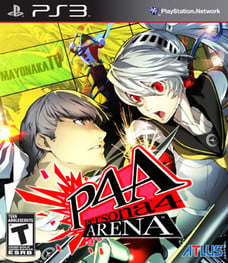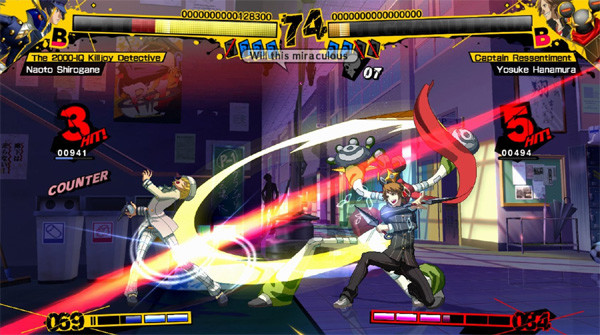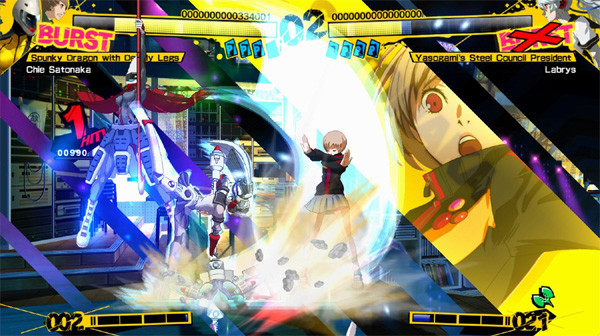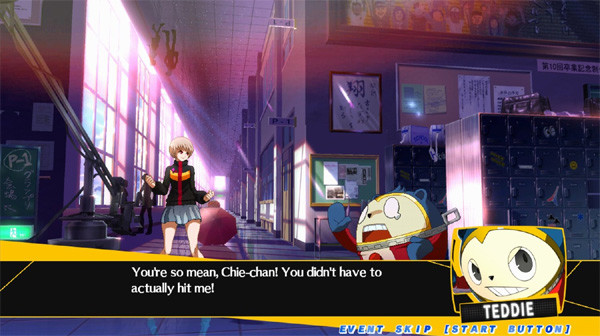Game Review
by Todd Ciolek,Persona 4 Arena
PlayStation 3, Xbox 360
| Description: |  |
||
Two months after the end of Persona 4's murder mystery, the ominous Midnight Channel re-appears and advertises a bizarre fighting tournament. Drawn into the fray and slapped with unflattering nicknames, the main characters of Persona 4 clash with each other as well as some new arrivals to the Channel's nightmarish realm. |
|||
| Review: | |||
There's something unnatural about Persona 4 Arena. The original Persona 4 was a gentle-paced RPG where social calendars and lazy afternoons mattered almost as much as the twisted labyrinths and demonic undercurrents. Persona 4 Arena is a fighting game, built upon the quick, brutish fix of bashing an enemy unconscious in three minutes' time. And it's made by Arc System Works, the outfit behind the utterly chaotic Guilty Gear and BlazBlue. Yet that's appropriate for the Persona series, where characters often hide dark and troubling doppelgangers. Arena may be a violent cash-in, but it's undoubtedly a part of Persona 4. Arena returns the game's formerly reticent protagonist to the bucolic town of Inaba. No longer a silent vessel for the player's input, our hero has the canon name of Yu Narukami and some larval signs of a personality. He's not the only guest coming back, either. The town also sees the resurgence of the Midnight Channel, the same mysterious TV station that turned characters' insecurities into horrific mazes throughout Persona 4. This time, however, the network's broadcasting promos for a fighting tournament starring Yu and his friends.  Before long, Yu gathers up his fellow Mystery-Solving Teens: martial-arts nut Chie Satanoka, perpetual screw-up Yosuke Hanamura, and elegant goofball Yukiko Amagi. The channel soon draws in Persona 4's other faces, including sensitive punk Kanji Tatsumi, uptight detective Naoto Shirogane, and the cuddly, pun-spewing creature called Teddie. It also gathers Persona 3's Mitsuru Kirijo, Akihiro Sanada, Aigis, and Elizabeth. And then there's a robot named Labrys, who seems to be at the center of the Midnight Channel's mocked-up reality. Arena's careful to capture the Persona 4 cast in all their foibles, and it's just as careful to present a fighting game accessible to new players. Squaring off in standard 2-D fighter stages, characters have four buttons for attacking. Two deliver weak and strong blows, while the other two control a summoned Persona: a towering, grotesque spirit-creature that somehow symbolizers its user. All of the moves are performed with basic motions, and it's almost too easy to pull off a damaging, screen-filling combo. Simply holding forward and slamming the weaker attack button will unleash a series of strikes followed by a special move and, if a meter's built up, a flashy super attack. That's a bit much. Yet this isn't a simple fighting game by any means. Arena's matches rely on all sorts of techniques: Guard Cancels that counterattack, low-level sweeps, rising attacks that drain your life meter, Burst moves that hurl your opponent across the screen, short jumps, aerial turnarounds, instant-kills, and an All Out!! Attack that imitates Persona 4's big cloud of cartoon brawling. And you'll have to consider all of these while watching four different meters: your life bar, your Burst gauge, your SP percentage, and your Persona's hit count.  It's the Persona creatures that truly set Arena apart. They vary bizarrely in appearance and fighting style, but they'll all materialize and attack at the touch of a button. Their moves are usually a shade slower and more powerful than the strikes of mere humanoids, and they're not invincible. A Persona can take five hits before it's knocked out of commission for a few precious seconds, leaving you with a paltry two-button repertoire to defend yourself. You're running two characters at once in Arena, and the resulting strategies work your reptilian fighting-game brain in ways that the rest of the genre usually doesn't (except for CAPCOM's conveniently reissued JoJo's Bizarre Adventure). It's a refreshing idea.
Arena brings all of this together in a spectacle of nicely animated sprites, pretty 3-D backdrops, and a hectic pace that threatens to flip everything off the rails. Each round is a collage of sparkling, slashing, laser-spewing effects, and half the game's challenge lies in keeping your senses straight amid all of the rapid-fire attacks. The dust and glitz of it all even obscures the more elaborate points of the animation, such as Teddie launching himself from TVs or Elizabeth momentarily warping opponents into her book (and keeping her bemused expression even in defeat). The largely well-acted voices and pop-rock soundtrack are a little easier to make out, though they're second to the noise of battle. It's the same visual overload that made Guilty Gear so vital (and Blazblue fun despite its drab characters), but there are times when Arena's almost too much. For all of its fighter panache, Arena sticks close to its RPG spawning grounds. The game's “arcade” mode is talky enough on its own, but there's a far weightier story section. Here each character gets a plotline marked by long inner monologues and exposition, all with the text-heavy approach of a visual novel. It's perhaps the most in-depth story mode a fighting game's ever had, and that's part of the problem. Every tale doggedly recites the events of Persona 4 and sets up a character to brawl through the Midnight Channel's strange schoolyard simulacrum, staring down personal demons along the way. The intersecting stories repeat themselves all too often, and some descriptions are labored and unnecessary. It even makes an airplane hijacking sound dull.  These stories eventually find the same appeal as other Persona games, however. Amid all the prattle, each character's route reveals some new internal struggle or plot thread, gradually building a complete follow-up to both Persona 3 and Persona 4. It's also amusing at turns, though the writers insist on dragging out never-funny gags about Yukiko's cooking and Yosuke's homophobia. Surprisingly, it's newcomer Labrys who steals the show. Her tale's a clichéd one about robots finding their humanity amid cruel strokes of science, but it's elevated by some intriguing details about Persona's world—and by Labrys' precious, purposefully inconsistent New York accent (or Osaka dialect, should you opt for the Japanese track). On that note, the localization is competent, though the constant use of Japanese suffixes like “senpai” and “kun” often sounds strange in spoken English. At least it's fine when delivered in a certain android's Brooklyn patois. Perhaps the Persona series was always a fighter waiting to happen. In all of Persona 4's monstrous creatures, distraught heroes, and dark-edged pop atmosphere, a game like this lurked. And it emerged in top form. While it's too messy at some points and too stiff at others, there's a fierce and enjoyable center in Persona 4 Arena. Both the Persona series and the whole of fighting games are richer for it. |
|
The views and opinions expressed in this article are solely those of the author(s) and do not necessarily represent the views of Anime News Network, its employees, owners, or sponsors.
|
| Grade: | |||
Overall : B+
Graphics : A-
Sound/Music : B+
Gameplay : B
Presentation : B+
+ Surface looks great, Persona-based play adds a lot, and it's occasionally quite funny |
|||
|
discuss this in the forum (43 posts) |
this article has been modified since it was originally posted; see change history |
|||